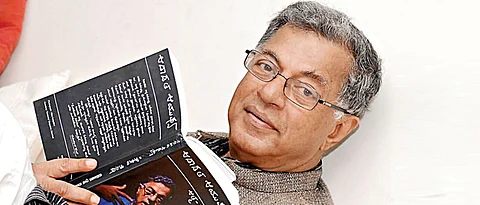

When Girish Karnad passed away, many media reports described him as the Tiger Zinda Hai actor, as if he needed to be in the same frame as Salman Khan to be noticed. Acting was just one aspect of Karnad, he had already reached legendary status as a playwright, and later, filmmaker before Bollywood roped him into acting, which, he often claimed, he did for money; he graciously allowed theatre groups to stage his plays by charging little or nothing. His work as an actor in films was wildly uneven, but most of his plays are milestones in Indian theatre.
He wrote his plays in Kannada, translated many of them into English himself; but almost all of them were translated into several languages and directed by some of the best directors in India. It is a sign of the high regard his plays have earned, that even the older ones, like Tughlaq, Hayavadana, Nagamandala are being performed somewhere or the other in the country, while the relatively newer ones like Flowers (Roysten Abel), Wedding Album (Lillete Dubey) and Boiled Beans On Toast (Lillete Dubey in English, Mohit Takalkar in Marathi as Uney Purey Shahar Ek) are being staged regularly. Surprisingly, hardly any of his plays were turned into films — Agni Varsha comes to mind — though so many of them had cinematic imagery built in.
Karnad is always clubbed together with Vijay Tendulkar, Badal Sircar and Mohan Rakesh, as that formidable quartet that took modern Indian theatre into a new age. What Karnad accomplished at the age of just 22, when he wrote Yayati (1961), was that he could take history, myths and folktales, and give them his own rich language and thought process, so that they could be seen in a completely fresh light, while still rooted in the Indian storytelling tradition. Of course, directors were excited with his early plays, because they could play with stage design, costume and music, and actors loved the idea of playing such wonderfully written characters.
Of the plays he wrote, they are all so varied in form and style, that it would be difficult to guess that the same person wrote Tughlaq and Odakalu Bimba (which he also co-directed with KM Chaitanya), a one-woman play about a writer with a big secret, in which a bank of television sets were used to emphasise her deceit (Shabana Azmi starred in the production directed by Alyque Padamsee). If Karnad wrote the folkloric Nagamandala and Hayavadana — in both a woman has to choose what she wants in a man — he also wrote Anju Mallige, about the incestuous relationship between a brother and sister.
His ideas were progressive, his style unique, the dialogue sharp and nuanced, so that a play like Tughlaq could be seen as a tragedy of a king’s delusions or as the misguided idea of governance by a well-intentioned ruler (it was seen as an allegory of the failure of Nehruvian idealism as well as Indira Gandhi’s Emergency imposition); Nagamandala was a reimagined folk tale that had a woman married to a loveless man express her desire with another — a snake in human form. His Taledanda was an exploration of the Lingayat movement in 12th century Karnataka. His last play, Rakshasa-Tangadi was about the Battle of Talikota in 1565, between Aliya Ramaraya of the Vijayanagar empire and the Deccan Sultanate. Any reader or viewer looking for subtext would find parallels (issues of class and caste, the individual and society) between history and contemporary society that Karnad so deftly juggled.
In fact, compared to his complex historical plays, the ones he wrote, set in present times — like Wedding Album and Boiled Beans On Toast — one about the Indian marriage obsession and the other about the perils of migration and urbanisation, seemed simplistic, though his observations were sharp and pertinent as always.
His meticulously researched plays did not grow out of a vacuum, but were the result of a mind that was engaged at various levels with the social and political reality of Karnataka and India; and, like so many writers and artists, he did not hide behind his work, awards and erudition, but came out to speak for and against causes he believed in. Which is why, groups of theatre people are gathering together spontaneously at various venues to read his plays — a true tribute to a great playwright would be to never let his plays vanish from the stage... or fade from memory.
Plays by Girish Karnad
- Maa Nishaadha (1959) (One Act Radio Play)
- Yayati (1961)
- Tughlaq (1964): One of his most powerful and frequently staged plays, translated into Hindustani by BV Karanth and directed by Ebrahim Alkazi (a memorable production set against Delhi’s Purana Qila), Satyadev Dubey, Dinesh Thakur, Prasanna, Arvind Gaur and Shyamanand Jalan (in Bengali)
- Hayavadana (1972)
- Anju Mallige (1977)
- Hittina Hunja (1980): Bali in Hindi
- Nagamandala (1988)
- Taledanda (1990): Rakt-Kalyan in Hindi, translated by Ram Gopal Bajaj
- Agni Mattu Male (1995): Agni Aur Varsha in Hindi, The Fire and the Rain in English
- Tipu Sultan Kanda Kanasu: The Dreams of Tipu Sultan in English
- Odakali Bimba (2006): Bikhre Bimb in Hindi; A Heap of Broken Images in English
- Maduve Album (2006): Wedding Album in English
- Flowers (2012)
- Benda Kaalu on Toast (2012): Boiled Beans On Toast in English
- Rakshasa-Tangadi (2018)
